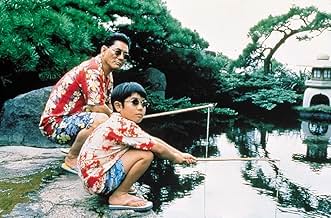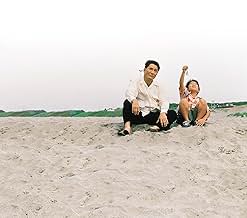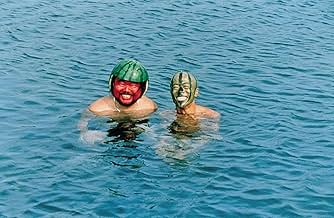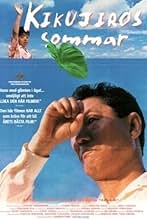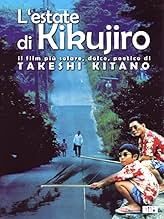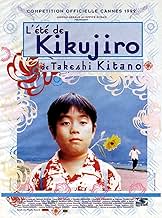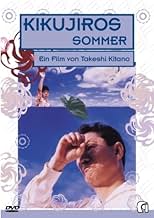CALIFICACIÓN DE IMDb
7.7/10
23 k
TU CALIFICACIÓN
Un muchacho joven e ingenuo emprende el camino solo en busca de su madre rebelde. No tarda en encontrar un dudoso protector en un hombre cascarrabias, y ambos viven una serie de aventuras in... Leer todoUn muchacho joven e ingenuo emprende el camino solo en busca de su madre rebelde. No tarda en encontrar un dudoso protector en un hombre cascarrabias, y ambos viven una serie de aventuras inesperadas en el camino.Un muchacho joven e ingenuo emprende el camino solo en busca de su madre rebelde. No tarda en encontrar un dudoso protector en un hombre cascarrabias, y ambos viven una serie de aventuras inesperadas en el camino.
- Premios
- 4 premios ganados y 4 nominaciones en total
Takeshi Kitano
- Kikujiro
- (as Beat Takeshi)
The Great Gidayû
- Biker
- (as Gurêto Gidayû)
Beat Kiyoshi
- Man at Bus Stop
- (as Bîto Kiyoshi)
Yôji Tanaka
- Yakuza Henchman
- (as Yoji Tanaka)
- Dirección
- Guionista
- Todo el elenco y el equipo
- Producción, taquilla y más en IMDbPro
Opiniones destacadas
In the title role of this highly original 1999 road movie, Beat Takeshi - with his twitching eye and bow-legged shuffle - looks and acts like a cross between Mickey Rourke and Harvey Keitel with a heavy dose of Walter Matthau's sourpuss demeanor (circa "The Bad News Bears") for good measure. He creates a truly memorable character - cynically profane, unapologetically insulting, childishly manipulative and somehow likable. As the director and screenwriter of said film, Takeshi Kitano - the same guy - has fashioned something quite unique from a tired premise - a boy's search for his mother and the gruff man who begrudgingly helps find her. What could have been a predictable and sentimental wallow, especially with the indiscriminate use of angels as a pervasive symbol, is instead an idiosyncratic, emotionally adroit film that sometimes simmers on the cusp of violence.
Yet it becomes ultimately affecting almost in spite of itself. In fact, Kitano does such a resolutely offbeat job that at certain times, the film reminds me of the narrative ellipses and low steady shots that were the trademark of Yasujiro Ozu's home dramas, intermingled with a surprisingly intense Quentin Tarantino-like, in-your-face edginess. The protagonist of the film is really the latch-key nine-year old, Masao, who is on a quest to find the mother whom his grandmother says is "away working". With his sad eyes and cherubic face, Yusuke Sekiguchi is perfectly cast as Masao providing the moral compass for the story. Whether he is running with his arms flailing or forlornly playing soccer by himself, he is poignant without being saccharine and completely natural. It is Masao's scrapbook that provides the framework for the film lending each chapter a descriptive title. Every chapter has a distinct character that is, in various turns, playful, hilarious, disturbing, surreal and heartbreaking. Case in point: Kitano is not afraid to use a child molester as first an uncomfortable source of black humor and then as the subject of Masao's nightmare. My favorite scenes come toward the end when Kikujiro organizes a motley crew of misfits to play games with Masao and have them masquerade as Indians, aliens, marine life and even watermelons. The variety in tone between chapters makes for unexpected tonal shifts, but somehow it works and adds to the greater context of the story.
That Kitano is able to manage a consistent film-making style with a strong visual sense is a credit to the talent behind the camera - not only Kitano's direction, script and film editing but also his artwork showcased throughout the movie, Katsumi Yanagishima's sharply rendered cinematography and Joe Hisaishi's evocative Windham Hill-like score. There are some funny sideline performances from Gidayu Great and Rakkyo Ide as Fatso and Baldy, two bikers who turn out to be the Abbott and Costello of soft-hearted slackers; Nezumi Mamura as a free-spirited drifter; Fumie Hosokawa as a relentlessly perky girl with a talent for juggling; and in the opening sequence, Kayoko Kishimoto as Kikujiro's take-no-prisoners wife. Kitano, however, elicits the most laughs if only for the film's central conceit that he gets away with his infantile gangster behavior. One would think the story would climax when Masao comes upon his mother, but Kitano confounds expectations with every new scene. The DVD really has no extras other than a couple of trailers not related to the film (not coincidentally, one is for Walter Salles' "Central Station" which has a similar story structure). I know this film has its detractors, especially among fans of Kitano's bloodier work, but I find it intriguingly ambiguous and thoroughly enjoyable.
Yet it becomes ultimately affecting almost in spite of itself. In fact, Kitano does such a resolutely offbeat job that at certain times, the film reminds me of the narrative ellipses and low steady shots that were the trademark of Yasujiro Ozu's home dramas, intermingled with a surprisingly intense Quentin Tarantino-like, in-your-face edginess. The protagonist of the film is really the latch-key nine-year old, Masao, who is on a quest to find the mother whom his grandmother says is "away working". With his sad eyes and cherubic face, Yusuke Sekiguchi is perfectly cast as Masao providing the moral compass for the story. Whether he is running with his arms flailing or forlornly playing soccer by himself, he is poignant without being saccharine and completely natural. It is Masao's scrapbook that provides the framework for the film lending each chapter a descriptive title. Every chapter has a distinct character that is, in various turns, playful, hilarious, disturbing, surreal and heartbreaking. Case in point: Kitano is not afraid to use a child molester as first an uncomfortable source of black humor and then as the subject of Masao's nightmare. My favorite scenes come toward the end when Kikujiro organizes a motley crew of misfits to play games with Masao and have them masquerade as Indians, aliens, marine life and even watermelons. The variety in tone between chapters makes for unexpected tonal shifts, but somehow it works and adds to the greater context of the story.
That Kitano is able to manage a consistent film-making style with a strong visual sense is a credit to the talent behind the camera - not only Kitano's direction, script and film editing but also his artwork showcased throughout the movie, Katsumi Yanagishima's sharply rendered cinematography and Joe Hisaishi's evocative Windham Hill-like score. There are some funny sideline performances from Gidayu Great and Rakkyo Ide as Fatso and Baldy, two bikers who turn out to be the Abbott and Costello of soft-hearted slackers; Nezumi Mamura as a free-spirited drifter; Fumie Hosokawa as a relentlessly perky girl with a talent for juggling; and in the opening sequence, Kayoko Kishimoto as Kikujiro's take-no-prisoners wife. Kitano, however, elicits the most laughs if only for the film's central conceit that he gets away with his infantile gangster behavior. One would think the story would climax when Masao comes upon his mother, but Kitano confounds expectations with every new scene. The DVD really has no extras other than a couple of trailers not related to the film (not coincidentally, one is for Walter Salles' "Central Station" which has a similar story structure). I know this film has its detractors, especially among fans of Kitano's bloodier work, but I find it intriguingly ambiguous and thoroughly enjoyable.
Vignettes of childhood memories - possibly Kitano's own childhood experiences and impressions, "Kikujiro" is not like the deep or layered deliveries Kitano has in "Fireworks" (Hana-bi) 1997, or "Sonatine" 1994. There are no cops or graphic depictions of violence. There are still some gangster-type characters, but the encounters are simple, requiring no synthesis. Kitano's familiar elements and locales are present: drawings, vignettes, seaside, temple, and angels.
It's really a loving portrayal of one little boy, Masao's, summer, spent with this seemingly eccentric retired gangster "Mister" played by Kitano. We have a pair of comic bikers, a lone van traveler, an arguing truck driver, a fun juggling couple, prankish hitchhiking gags, and a rather extensive betting session at the (bicycle) races. There are occasions for sentimental tears, for instance, when "Mister" took a side trip to visit his own mother; but play is the key operative here. Even though the child appears to be a sulky non-smiling little boy most of the time, a boy will be a boy when it comes to play and open up to lightness of the heart.
If you're the hurrying kind, this film may not be for you. The film is at its own flow and pace. It's Masao's summer vacation adventures, and he's not in a hurry to go home. Joe Hisaishi's theme music for "Kikujiro" certainly is catchy and the score gave Kitano's film its rhythm and accents along this unlikely pair's journey - a grown man, who's become childlike once more while escorting Masao on his quest to fulfill the dream of seeing his mother. Does it matter whether Masao sees his mother or not? He gains a friend, Kikujiro.
Kudos to Sony Pictures Classics for their film distribution selections! At the recent Bravo cable channel's IFC (Independent Film Channel) tenth Gotham Awards, Catherine Deneuve presented the Industry Lifetime Achievement Award to the trio: Tom Bernard, Marcie Bloom, Michael Barker. It was noted: "This award is being created specifically for this year's ceremony to honor the trio for their 20 years of service as champions of independent filmmakers." Besides the theme from Woody Allen's "Sweet and Lowdown", Joe Hisaishi's music from "Kikujiro" was mostly used during the montage of the film clips. Films the trio has co-produced include the popular 1999 Tom Tykwer's "Run Lola Run" (German), Pedro Almodovar's 1999 triumph "All About My Mother" (Spanish), the Brazilian gem in 1998 "Central Station", Hal Hartley's 1997 saga "Henry Fool", John Sayles' 1996 hit "Lone Star", the 1995 French surprise "The City of Lost Children", and as far back as 1971 Vittorio De Sica's "The Garden of the Finzi-Contini".
It's really a loving portrayal of one little boy, Masao's, summer, spent with this seemingly eccentric retired gangster "Mister" played by Kitano. We have a pair of comic bikers, a lone van traveler, an arguing truck driver, a fun juggling couple, prankish hitchhiking gags, and a rather extensive betting session at the (bicycle) races. There are occasions for sentimental tears, for instance, when "Mister" took a side trip to visit his own mother; but play is the key operative here. Even though the child appears to be a sulky non-smiling little boy most of the time, a boy will be a boy when it comes to play and open up to lightness of the heart.
If you're the hurrying kind, this film may not be for you. The film is at its own flow and pace. It's Masao's summer vacation adventures, and he's not in a hurry to go home. Joe Hisaishi's theme music for "Kikujiro" certainly is catchy and the score gave Kitano's film its rhythm and accents along this unlikely pair's journey - a grown man, who's become childlike once more while escorting Masao on his quest to fulfill the dream of seeing his mother. Does it matter whether Masao sees his mother or not? He gains a friend, Kikujiro.
Kudos to Sony Pictures Classics for their film distribution selections! At the recent Bravo cable channel's IFC (Independent Film Channel) tenth Gotham Awards, Catherine Deneuve presented the Industry Lifetime Achievement Award to the trio: Tom Bernard, Marcie Bloom, Michael Barker. It was noted: "This award is being created specifically for this year's ceremony to honor the trio for their 20 years of service as champions of independent filmmakers." Besides the theme from Woody Allen's "Sweet and Lowdown", Joe Hisaishi's music from "Kikujiro" was mostly used during the montage of the film clips. Films the trio has co-produced include the popular 1999 Tom Tykwer's "Run Lola Run" (German), Pedro Almodovar's 1999 triumph "All About My Mother" (Spanish), the Brazilian gem in 1998 "Central Station", Hal Hartley's 1997 saga "Henry Fool", John Sayles' 1996 hit "Lone Star", the 1995 French surprise "The City of Lost Children", and as far back as 1971 Vittorio De Sica's "The Garden of the Finzi-Contini".
By 1999 Takeshi Kitano had quite rightly gained a lot of international recognition for his brilliantly constructed Yakuza/Cop stories, but was apparently dis-satisfied that everybody tended to focus on the violence in them. So he decided to make a movie without any violence to remind people that he was a much more rounded talent than that. "Are you sure about this?", the world asked. "Yes", he replied... and made Kikujiro.
Kikujiro is difficult to adequately describe, but the fact that it was allegedly inspired by the Wizard of Oz is a good starting point. The basic premise is a road trip, where Kitano is the unlikely chaperone for a little boy who wants to go and find his mother. After gambling away all the money his wife gives him to take the kid, they have to improvise their transport across the country. Along the way they meet a small but colourful cast of characters, and get to know each other a little bit too.
I'd hesitated about picking this up for ages, and eventually went for a rental rather than a purchase. Kitano minus violence just didn't seem right! But that was definitely an injustice I was doing him, and Kikujiro is a good demonstration that his talents really are much broader. In fact, after watching it there is no doubt that he is one of the greatest director/actor/writer and editor working in the world today. A brilliantly painted story, full of subtly and quirkiness. Awesome cinematography and an incredible soundtrack... truly world class in every respect. Well, to be fair the child actor was a bit stiff, but it seems mean to hold that against the movie.
Definitely recommended if you haven't already seen it!
Kikujiro is difficult to adequately describe, but the fact that it was allegedly inspired by the Wizard of Oz is a good starting point. The basic premise is a road trip, where Kitano is the unlikely chaperone for a little boy who wants to go and find his mother. After gambling away all the money his wife gives him to take the kid, they have to improvise their transport across the country. Along the way they meet a small but colourful cast of characters, and get to know each other a little bit too.
I'd hesitated about picking this up for ages, and eventually went for a rental rather than a purchase. Kitano minus violence just didn't seem right! But that was definitely an injustice I was doing him, and Kikujiro is a good demonstration that his talents really are much broader. In fact, after watching it there is no doubt that he is one of the greatest director/actor/writer and editor working in the world today. A brilliantly painted story, full of subtly and quirkiness. Awesome cinematography and an incredible soundtrack... truly world class in every respect. Well, to be fair the child actor was a bit stiff, but it seems mean to hold that against the movie.
Definitely recommended if you haven't already seen it!
Maybe Takeshi Kitano remembered his travel with his father (Kikujiro), maybe he just wanted to show his father just like he wanted to see him. Anyway this film, despite of very few words and quite simple dialogue lines, shows so many emotions that after seeing it, sometimes laughing, sometimes sad and full of empathy, i have spent many days thinking of it. How can grown-up simple man witch is not quite good in relationships with people, can spent so much time with little boy. How so violent person can show beautiful world to sad little boy. Takeshi is one of my favorite actor/director/writer. I discovered him just by being bored with all-the-same Hollywood movies. Now, thanks to him, I'm truly in "love" with Asian movies. For those who liked this movie, and wants to see some good others, see the Hana-Bi (little violent, but even more deep) and Dolls (i was crying - one reason was i was touched, second - beauty of the colors and form).....For me its just one word - Outstanding.
Kikujiro is a movie with beautiful calmness that's a great diversity from the fast cut movies today. Takeshi Kitano proofs once and for all, that he's a master filmmaker that will forever be remembered. And even though he dislikes the fame that goes along with his more successful movies (Zatoichi), it's a shame he doesn't get more recognition for his films.
Kikujiro no natsu tells the story of a kid who decides to visit his mother that he never met. Through odd circumstances kikujiro (Kitano), though absolutely unqualified, is forced to lead the kid. But as we see only moments later the boy would be better off alone, as kikujiro's fondness of gambling and (very amusing) way to treat people makes the journey a funny and quite touching odyssee.
What stands out in this movie is the simple comedy. It shows Kitano started off as a comedian, and his dialogue and acting made me almost spill my milk more than a few times. This is certainly one of his best. A great film for a quiet, rainy sunday afternoon.
Kikujiro no natsu tells the story of a kid who decides to visit his mother that he never met. Through odd circumstances kikujiro (Kitano), though absolutely unqualified, is forced to lead the kid. But as we see only moments later the boy would be better off alone, as kikujiro's fondness of gambling and (very amusing) way to treat people makes the journey a funny and quite touching odyssee.
What stands out in this movie is the simple comedy. It shows Kitano started off as a comedian, and his dialogue and acting made me almost spill my milk more than a few times. This is certainly one of his best. A great film for a quiet, rainy sunday afternoon.
¿Sabías que…?
- TriviaTakeshi Kitano made this gentler film as an antidote to his usual violent gangster movies.
- Créditos curiososThere's one more scene after the credits.
- ConexionesFeatured in Jam session - Kikujiro no natsu koshiki kaizokuban (1999)
- Bandas sonorasSummer
Written by Joe Hisaishi
Selecciones populares
Inicia sesión para calificar y agrega a la lista de videos para obtener recomendaciones personalizadas
- How long is Kikujiro?Con tecnología de Alexa
Detalles
- Fecha de lanzamiento
- País de origen
- Sitios oficiales
- Idioma
- También se conoce como
- Kikujiro
- Locaciones de filmación
- Sensoji Temple, Asakusa, Taito, Tokio, Japón(Masao and his friend walk across the temple grounds)
- Productoras
- Ver más créditos de la compañía en IMDbPro
Taquilla
- Total en EE. UU. y Canadá
- USD 200,920
- Fin de semana de estreno en EE. UU. y Canadá
- USD 28,079
- 28 may 2000
- Total a nivel mundial
- USD 281,527
- Tiempo de ejecución2 horas 2 minutos
- Color
- Mezcla de sonido
- Relación de aspecto
- 1.85 : 1
Contribuir a esta página
Sugiere una edición o agrega el contenido que falta


